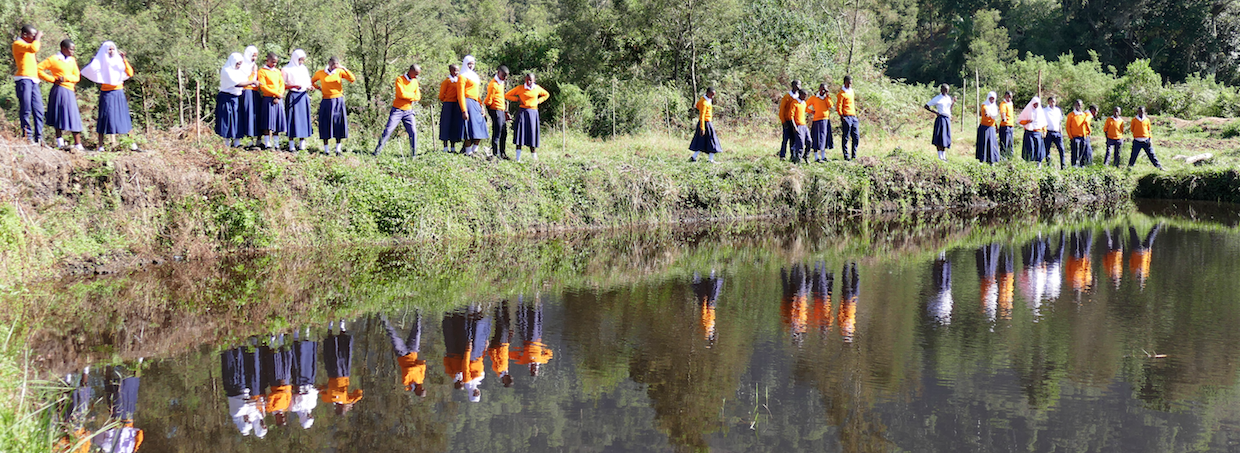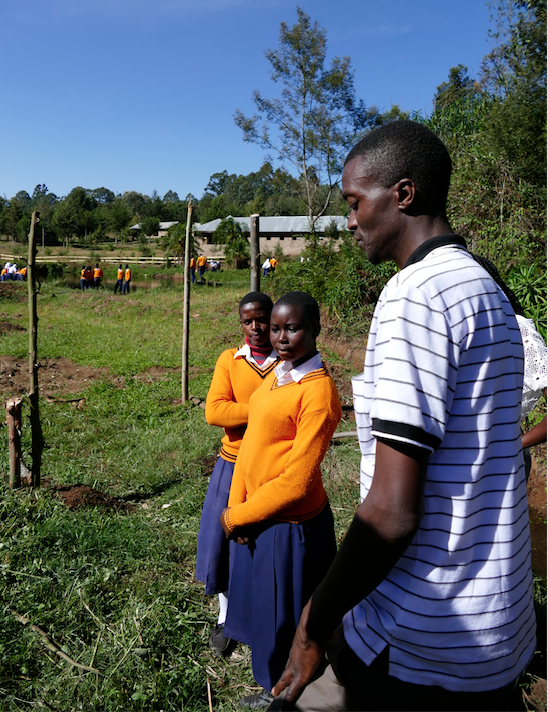LEI Program Inspires a New Student Venture: Fish Farming
April 6, 2021
At Magamba Secondary School in Tanzania, fish farming is creating quite a stir. Students from neighboring schools, even some colleges, and community members come to see the fish ponds that Magamba’s students themselves constructed. The ponds- three in total- are part of a fish farming project begun in 2019 by students who had participated in Asante Africa’s Leadership and Entrepreneurship Incubator (LEI) Program. There, they found inspiration and motivation to begin their own venture. Against many challenges, they have persevered and today, they welcome the opportunity to share their experience and knowledge. Exemplars of one of Asante Africa’s core principles, these young leaders are eager to “Pay-It-Forward.”
The Inspiration to Begin A Fish Farming Project
Had it not been for the business and leadership training that students received during the LEI Program, a fish farming project may not have gained much traction. Indeed, for many of Magamba School’s attendees, learning to create opportunity from available resources was one of the greatest takeaways from the LEI summit. Joseph Mdoe, a teacher at Magamba School and supervisor of the fish farming project, is confident that this lesson will serve students well in the future.

“Acquiring knowledge on how to study their surroundings and use resources from within will help them overcome economic hardship in their families and communities at large.” Joseph Mdoe, Teacher, Magamba School
Turning Project Inspiration into a Fish Farming Reality
Magamba School is located in Lushoto in northeast Tanzania, bordering Kenya. Nestled in the Usambara mountain range, Lushoto is a biodiversity hotspot boasting rich tropical rainforest. Taking advantage of their moisture-rich surroundings, students got to work digging water channels to fill a pond and planting grass to stabilize its bank.
With grit and determination, the students managed to construct two ponds in just a few months. However, what came next proved a bit more challenging. The students pooled enough of their own money to purchase their first fish, but lacking a comprehensive knowledge of fish farming, the students lost over thirty percent of their initial investment. Undeterred, the students worked to identify and resolve the problem before introducing fish into the second pond. This perseverance paid off. With their second attempt, students lost just two percent of the fish they introduced.
Students Achieve Fish Farming Project Success
Today, there are three fish farming ponds at Magamba School, with plans for two more underway. Despite a rocky beginning, students did not lose the motivation that the LEI Summit had inspired.
Disappointed but not dissuaded after their first trial, students reached out to fish farmers nearby for advice. On their guidance, students turned to tilapia, a popular fish in nearly all sub-Saharan countries and relatively easy to raise.
Given fish consumption patterns in the region (and in the world), and the fact that nearly all tilapia produced in Sub-Saharan Africa is locally consumed, learning to successfully rear this freshwater fish unlocks incredible economic potential.
Indeed, population growth, rising incomes, and seafood’s growing popularity as a heart-healthy food source are expected to drive up aqua-cultural demand by 35 percent or more in just the next 20 years. In this context, fish farming offers much more than an extracurricular diversion. It equips students with skills to advance in a rapidly-expanding industry and to successfully compete in a global marketplace.

Young Entrepreneurs Still Face Challenges with Fish Farming Projects
Though the fish farmers of Magamba School have accomplished much in just two years, numerous challenges remain.
• Primary among them is a lack of equipment, specifically a shortage of fishing nets. This is a common problem, not just in rural East Africa but in impoverished communities across the globe.
As more people are adopting mosquito nets as a readily available alternative (provided free or at very low-cost in many low-income countries), the threat that this poses to environment has led some governments to legislate against this practice, even imposing prison sentences for violations (and thereby fueling an ethical debate over the implications for food security and livelihoods.) Though selling fish had been a primary objective, Magamba School’s faculty supervisor admits that the lack of needed equipment, including fishing nets, has thus far prevented students from being able to meet this goal.
• Beyond materials deficiency, students running the project lack expertise in fish farming. Despite consulting with area fish farmers and drawing from an expanding repertoire of first-hand experience, students at Magamba School are not experts of aquaculture, not yet anyway.
While in larger operations, tasks of raising and harvesting the fish are divided among teams, at Magamba School, students must do it all. Students view every challenge as an opportunity to learn and improve, and though they are certainly making the most of this learn-as-you-go strategy, students are anxious to learn from experts in the field.
When his students first approached him about starting a fish farm at Magamba School, Joseph Mdoe enthusiastically lent his support. Looking at the lush environment that surrounded the school and listening to the students’ project plan, he saw tremendous potential in the idea. He still does. But transforming fishponds into a profit source – a project goal set from the beginning- has been a real struggle, Mdoe acknowledges, and one that may not be overcome without equipment and specialized training.
Paying-It-Forward: Sharing Lessons in Fish Farming and Entrepreneurship
Even as they continue to work through these challenges, students are happy to share their experience with peers and neighbors, Paying-It-Forward as proud graduates of Asante Africa programming. Mdoe describes Magamba School’s fish farm as a “center of learning,” attracting students from nearby schools and members of the community curious to see just what the boys and girls at Magamba School have accomplished. “They are very much impressed with what these young boys and girls are doing. They ask how it was possible for these students to come up with this idea of raising fish?”

So inspired were students by what they had learned during the LEI Program that they returned to Magamba School and started a fish farm. They built a fishpond (and then two more); and bought the fish with their own money. With no shortage of dedication, fortitude, and hard work, these students have already accomplished what some may have thought impossible, at least improbable. Now imagine what these young bright change makers might be able to do with a proper fishing net and a little technical support. Together, let’s find out.
Written By: Beth Garcia
